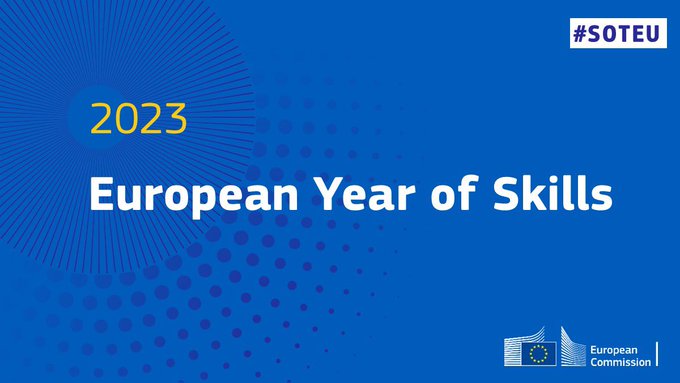Ursula von der Leyen delivered her third State of the Union address
President of the EU Commission outlined priorities for next year. What are the main topics of interest in education and research?
Every year, the President of the European Commission delivers the State of the Union address to the European Parliament. In the address, the President mentions what was achieved in the past year and what are the priority topics for the year ahead. Ursula von der Leyen also pointed out the number of challenges that the European Union is facing and outlined how the European Commission will address them. She also highlighted several education and research initiatives.
„Never before has this Parliament debated the State of our Union with war raging on European soil. But from that very moment, a whole continent has risen in solidarity. We have brought Europe’s inner strength back to the surface,“ sayid the President as the opening to her State of the Union on 14 September. In 2022, several major events were affecting whole Europe: the ongoing COVID-19 pandemic, the escalating climate crisis, the war in Ukraine and the energy crisis. Europe has responded quickly and united, however it is not over yet. The coming months will be challenging and very important, it is therefore necessary to get prepared for them adequately.
The President then presented several proposals that have been or will soon be tabled and outlined flagship initiatives, which the Commission plans to undertake in the coming year. The initiatives among others include:
-
continuing to strongly support Ukraine and its people, including by mobilising the full power of the EU’s Single Market;
-
Putting in place measures to support Europeans in weathering the energy crisis, to reduce gas prices, ensure security of supply and competitiveness;
-
Supporting the business environment, particularly small and medium enterprises, to strengthen Europe’s future competitiveness;
-
Cutting the EU’s dependency on Russian fossil fuels, and working closely with reliable suppliers;
-
Leading globally on climate adaptation and protecting our nature;
-
Continuing to stand up for democracy, at home and across the world, and for the rule of law;
-
introducing some new initiatives such as the European Space Strategy for Security and Defence, the Patent Licensing Package.
Research priorities
In the field of research, Von der Leyen presented a plan to increase investments in energy from renewable sources and hydrogen in particular. For this purpose, a new European Hydrogen Bank will be created, which will help guarantee the purchase of hydrogen by using resources from the Innovation Fund. In her speech, the President of the Commission also drew attention to the need for further investments in the digital and climate-neutral economy, renewable resources and support for small and medium-sized enterprises.
With regard to contributing to the objectives of the Green Deal for Europe, the Commission will soon present the European Act on Critical Raw Materials. Von der Leyen pointed out the need to end dependence on the supply of raw materials. Their availability is essential for the success of the transformation to a sustainable and digital economy. For this reason, the EU will increase its financial participation in important projects of common European interest and will strive for the creation of a new Fund for European Sovereignty in the future.
2023 to be the European Year of Skills
Von der Leyen emphasized that European businesses are facing a shortage of qualified employees, so there is a need to invest in vocational training and skills development. Cooperation with the business sector is essential in this context, as it can identify the best the current and future needs of the labor market. Support should also be focused on higher education and lifelong learning, as it is necessary to equip employees and professionals at all levels, in different fields (from services to IT) and at different career stages with the relevant skills. The President therefore declared 2023 the European Year of Skills.
Another challenge in the field of education is to make the EU more attractive for experts and scientists from abroad. The first prerequisite for achieving this goal is to speed up and facilitate the recognition of qualifications of third country nationals. Another education initiative von der Leyen mentioned is the Cybersecurity Skills Academy. During her speech, the President also touched upon the issue of spreading misinformation on the academic institutions.
In the end, the President conveyed a touching story of two girls from Poland, who did not hesitate to immediately get involved in helping Ukrainian refugees. Their story is about what the European Union stands and strives for - heart, character and solidarity. The complete State of the Union address and video recording can be found on the European Commission website.
